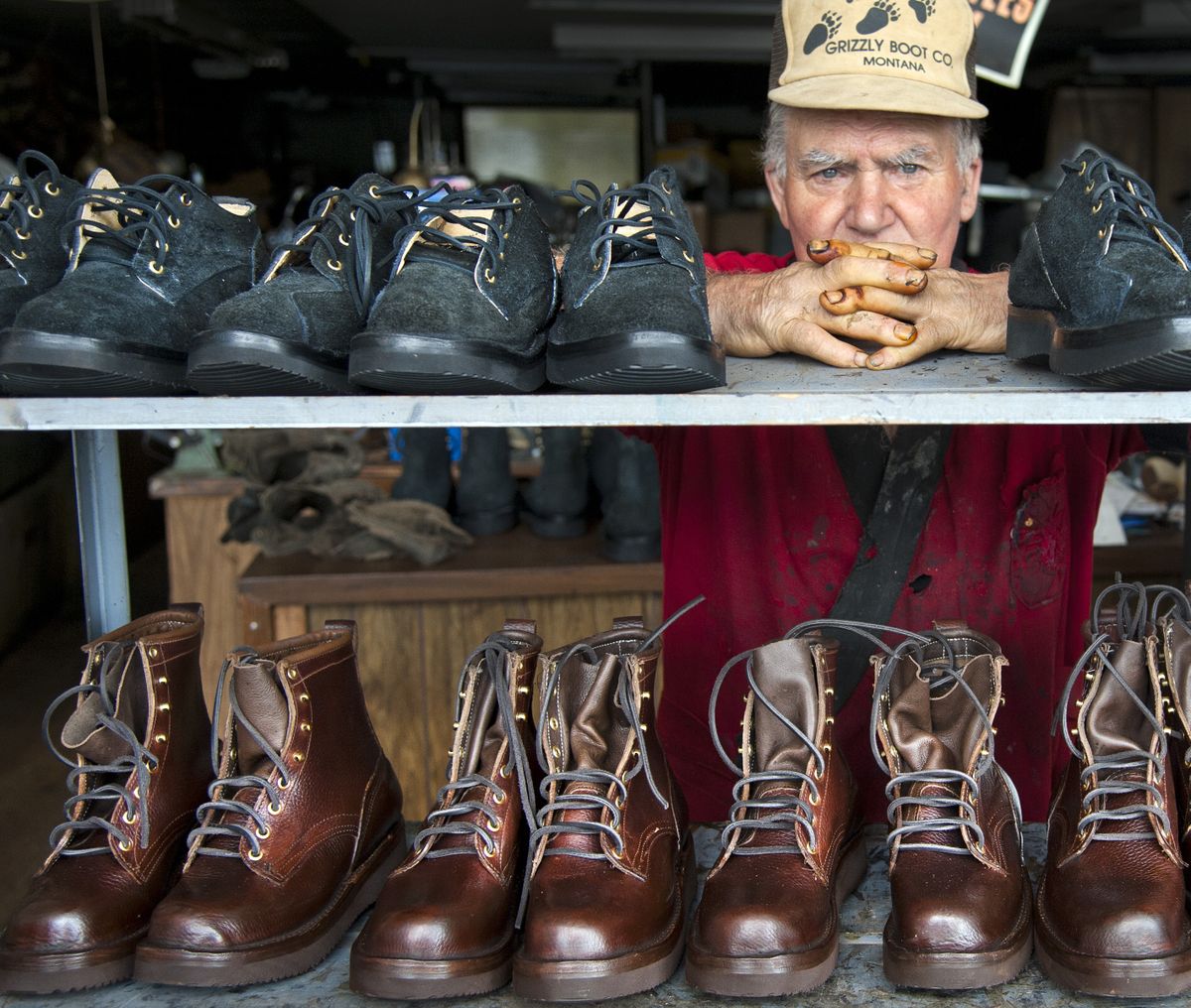This column reflects the opinion of the writer. Learn about the differences between a news story and an opinion column.
Shawn Vestal: Shoe craftsman embodies Spokane industry niche

At the fringe of the yoga-soy block of hipness on West Main sits a small, dusty storefront where one man makes boots with his own thick, ink-stained hands.
Cruz Albisu, an immigrant from the Basque region of Spain, has been practicing a time-honored but fading craft for decades. His main products are work boots for logging and other outdoor labor, but don’t pigeonhole him.
“I do dress shoes, sandals – anything!” Albisu says in his enthusiastic and heavily accented voice.
His shop, at 209 W. Main Ave. next to the new University of Washington center, is cluttered and jumbled with half-finished boots, shoe forms called “lasts,” antique stitchers and finishing wheels. The place looks nearly abandoned – the “open” sign hangs crookedly on the front door, the dusty front windows are mostly empty, and there is nothing like a front counter or entry point when you enter.
But look closely at the finished footwear among the mess. It is beautifully crafted. Calf-high black logging boots with rows of golden hooks. Blood-brown leather work boots with Vibram soles and gleaming eyelets. Roughside black leather Oxfords. Caulks and packs and “Romeo slippers.”
In a glass case sit two special pairs.
“This is elephant,” says Albisu, in a worn red smock stained from years of work. “This is shark.”
Near the front door sit shelves of work boots and Oxfords, bound for Japan. Albisu says he makes hundreds of pairs at a time for a Japanese wholesaler who came into his shop by coincidence 20 years ago.
In this respect, Albisu and his one-man enterprise are representative of Spokane’s custom shoe industry – a small but unusually strong segment of the region’s economy that is centered on White’s Boots, according to an economic analysis prepared last year. While this “footwear cluster,” as the analysis termed it, relies on loggers, construction workers, firefighters, farmers and others who depend on quality, custom footwear, it has also developed a significant international market that is fashion-oriented.
White’s, for example, sells about 35 percent of its boots overseas, in countries such as France, Russia and Japan, according to the 2014 analysis performed by business professors at Eastern Washington University for the Spokane Footwear Association.
Spokane’s cluster of custom shoemakers – also including Nick’s Custom Boots and JK Tailors and Custom Boots – is unusual outside the East Coast, the analysis said. It traces directly to Otto White, who came west and settled in St. Maries in 1902 and moved to Spokane in 1915.
“Handmade shoes are becoming a rarity,” the report said. “This is a unique cluster existing in only a select few states. There is a long history of businesses within this cluster in the Spokane area.”
White’s is the largest, and a handful of bootmakers have left employment there to go into business on their own, including Albisu.
When he tells his life story, Albisu can be a little fuzzy on the details – ages, years, numbers. But when he recalls his time at White’s, one thing is very clear, at least in his own telling: “I was No. 1 producer. I made nine pair of boots a day.”
Albisu came to America as a young man in his early 20s, working on ranches in California and Oregon. He moved to Spokane in 1970 to work at White’s, plying a skill he had learned as a teenager growing up in the Gipuzkoa province of the Basque region of Spain.
“No machine. All hand – everything,” he said, referring to his teenage apprenticeship. “One pair a day.”
He left White’s and set up his own shop in the early 1980s. Along the way, he earned his American citizenship.
In his shop, he displays letters of praise from customers, including a surveyor in North Carolina who bought three pairs of his boots, and who wrote: “If you don’t believe it, call me … and I WILL TELL YOU WHY YOU SHOULD HAVE CRUZ MAKE YOUR BOOTS!”
This customer included his phone number, which is no longer in service.
Albisu also has a giant carved grizzly bear looming over one side of the storefront, a reference to one of the names his business goes by: Grizzly Boot Co., a Montana company for which he has a franchise.
He works alone, and it’s hard to determine the scope or size of his business. He says – and has been saying for several years – that he hopes to bring in an employee or two and really kick up his production. He works long days, sometimes 14 or 16 hours, and he says he gets tired more quickly now that he’s older. He doesn’t reveal his age, but he is in his 60s.
“I pay my bills, but I want to produce,” he said.
He starts each pair of shoes with careful measurements: tracing each foot, measuring where the ball, instep and ankle fall, choosing color, style and leather. He cuts and stitches and soles them, and buffs them on the finishing wheels. The finished products start at roughly $450. In addition to hundreds of shoe parts, Albisu has several pieces of older shoe-making machinery, from stitchers to jacks.
Inside his shop, the air is still and warm – it can feel stifling in the recent triple-digit heat, but Albisu doesn’t mind it.
“I like it hot,” he said. “It’s free now. It costs nothing. In wintertime, it’s not free.”
